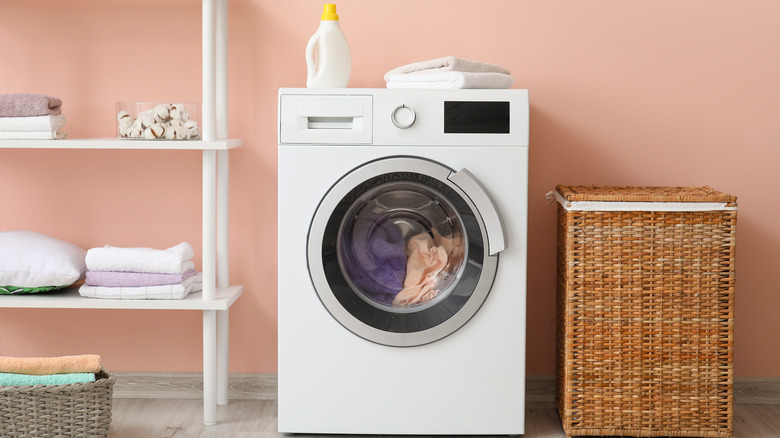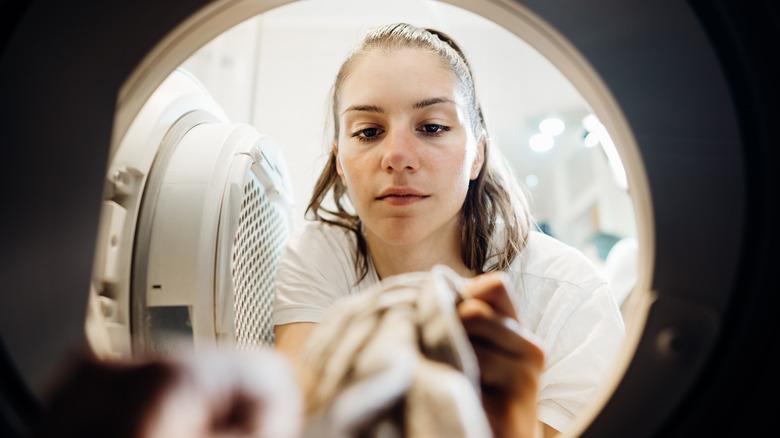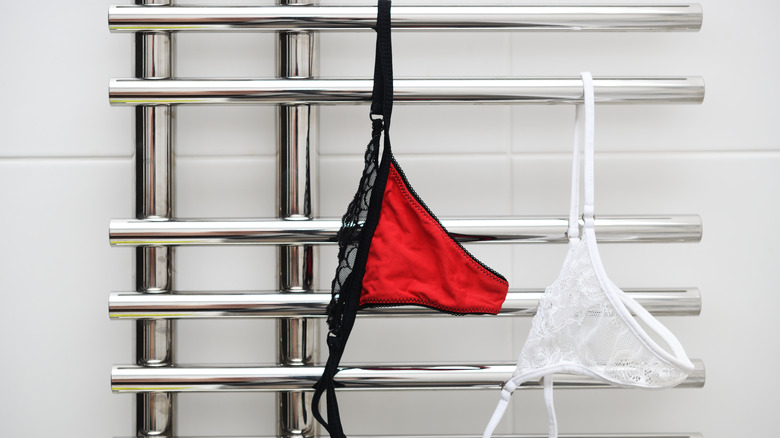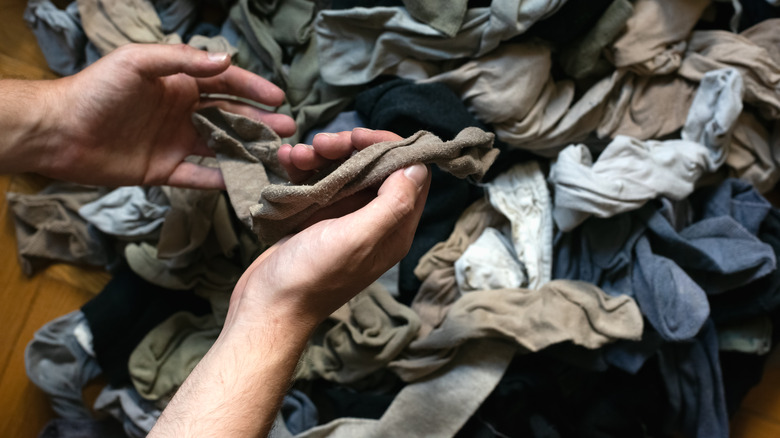Mistakes You Didn't Know You Were Making With Underwear
Underwear, panties, boxers, briefs, britches, knickers — whatever you call them, we all wear 'em. Most of us wear underpants daily, though there isn't any shame in your at-home commando game.
Underwear seems like a pretty straightforward article of clothing, right? It seems like anyone saying otherwise is just adding complexity to our already-complicated lives. However, many of us are walking around everyday with underoos that chafe, ride up, contribute to infections, and more! And the thing about underwear blunders is that tiny changes for the better could lead to serious health gains (via Oprah Daily). After scouring the internet and reading the opinions of OBGYNs and other experts regarding our nether-regions, we've discovered a plethora of underwear mistakes that you might be making. While women have more complicated systems down there, we aren't the only ones making snafus. We all have a lot to learn about outfitting our cheeks.
The crotch should be cotton
Underwear fabric choices can affect your overall health, and the best thing you can do is choose cotton underwear (via Healthline). If nothing else, at least ensure that the crotch is cotton. Failure to do so may increase your risk of health consequences. This is because the skin that makes up the vulva is super sensitive, and the best way to care for this ultra-sensitive zone is by cloaking it in the most breathable, soft fabric you can find — cotton! In addition to providing breathability, cotton also helps absorb excess moisture, which is a key component when it comes to overall vaginal health. The vagina is a self-cleaning organ, and one of the ways it stays clean is by discharging, well, discharge. Wearing underwear that can help absorb that moisture is a great way to avoid a yeast infection.
Furthermore, vaginas all have a homeostatic pH that they strive to maintain (via Healthline). Synthetic fabrics like nylon or spandex can trap heat and moisture and mess with the pH and temperature, setting the stage for unwanted bacteria to grow. If you plan to sweat a lot, moisture-wicking fabric is a great choice, but only if you take it off immediately after your sweat sesh.
You wash your underwear in cool water
Men and women alike can benefit from this jaw-dropping nugget of info: You shouldn't wash your underwear in cool water. In fact, the water needs to be at least 80 degrees Fahrenheit or higher and paired with the proper amount of high-quality detergent.
Even if you're changing your underoos on the daily, the list of nastiness that can accumulate in them in appalling. In addition to the standard vaginal discharge and sweat, Well + Good reports that dirt, urine, and feces also join the party, making the crotchal region of your undies a real zoo. Washing your skivvies in cool water isn't enough to stomp out the bacteria, though obviously doing so is better than nothing. But wearing underwear that hasn't been fully sanitized can lead to an increased risk of fungal jock itch, bacterial dermatitis, and genital infections. In addition to ensuring that your water temperature is warm enough to kill lurking little bugs, experts recommend spraying the crotch of your underwear with an antibacterial laundry spray, using bleach if they are white, or ironing them after their wash cycle to further sanitize them.
They are too small
Ladies and gentlemen, we have an announcement — size does matter, but get your heads out of the gutter. Wearing ill-fitting underwear can be a real pain in the arse, literally. Though the side effects of too-tight underwear vary between the genders, the general rule of thumb is that if the elastic leaves an imprint, they are too small (via Healthline). Though that's partly for general comfort's sake, but there are health implications too. For instance, men who wear briefs tend to have about a 25% lower sperm count than men who wear looser-fitting undergarments. Researchers believe this is because more constrictive underwear increases the temperature of the scrotum, similar to sitting in a hot tub or with a laptop on your lap. Though more research is needed to fully probe the effect of tighty-whiteys, currently there is no evidence to state that tight fitting underwear decreases sperm counts below the healthy and normal range.
For women, as with most things related to our genitals, things are a bit more complex. The studies that have been published on the subject of tight-fitting underwear are contradictory in nature. One 2014 study claims that too-tight fabric can increase ones propensity to develop yeast infections and UTIs, but an earlier study done in 2011 found no correlation.
You wash your undies with scented detergent
This is yet another female-focused underwear mistake. According to Healthline, hypoallergenic soap is best for your most delicate clothing, as these soaps are gentler on the soft skin of the vulva. Often, the chemicals in scented soaps can cause irritation, especially in a garment worn so close to your skin for a long period of time.
You might think that washing your undies with warm water and high-quality, hypoallergenic soap are the two keys to success, but Healthline offers a few more pro tips to keep your most sensitive bits devoid of irritation and itching. First and foremost, if you suspect you have bacterial vaginosis, see a doctor. If your doctor confirms that you have it, do yourself a favor and avoid washing your unmentionables with clean panties and pants to decrease the chance of cross-contamination. It is also advisable to wash your undies in a separate load from clothing that has been soiled with other bodily fluids. And finally, if someone you live with is sick, don't wash your underwear in the same load of laundry as their clothes.
You don't change your underwear daily
Generally speaking, it is definitely recommended that you change your knickers every day for overall health (via Healthline). Putting on a fresh pair can decrease your susceptibility to infections since you won't be leaving discharge-y, sweaty britches up against your most sensitive skin for longer than necessary. Some doctors say it is okay to wear the same underwear two days in a row if they stay relatively clean of sweat, discharge, urine, and fecal matter. But mostly it is best practice to swap them out daily, if not more often if that feels comfortable to you. If you work out a lot or experience more discharge than usual during different times of the month, by all means, change even more frequently. While you do not necessarily have to swap underwear like you are Adriana Lima in a Victoria's Secret runway show, it is best to change undies often for the sake of hygiene.
You don't change them after a workout
We've all been there. Spin class turns into yoga, which parlays into happy hour with friends, and before you know it, you've spent hours wearing the same clothes in which you worked up a sweat. Occasionally, this isn't a huge deal, but when it occurs day after day, there are likely to be some health consequences. Walking around in sweaty underwear means you have wet grime directly pressed up against some sensitive skin (The Healthy). This can lead to acne breakouts in the places where the sun don't shine, in addition to being uncomfortable — who wants to walk around in damp underwear all day? No thanks! The excess heat and moisture can create a health habitat for bacteria and other funk to proliferate (via Healthline). It's also important to remember that moisture-wicking underwear is great for workouts, but not so great for daily, non-exercise-related uses. But no matter which type of fabric you prefer for working out, experts recommend shedding your sweaty clothes post-workout to decrease your susceptibility to bacterial growth.
You only wear thongs
Let's back up — we aren't talking about thongs as in, "Make sure to grab your thongs for a walk on the beach." We are talking about underwear, the kind that offers coverage in the front and a party freedom in the back. The mullet of undergarments, but sexier, some might say. And while regularly wearing thongs isn't inherently unhealthy, as the rumors suggest, it turns out that not all thongs are created equal, and they come with a few caveats for health and safety.
Thongs, no matter the style, have the tendency to move around a bit, which can create friction and cause irritation (The Healthy). This can also introduce backside bacteria into the frontside, a big no-no for people with vulvas. If you choose to wear thongs, it is important to buy the right size. While too-small thongs might just cause unsightly bulges, too-big thongs can wriggle about and cause the aforementioned chafing and bacterial transportation. And as with all underwear, you need to launder them well to remove bacteria, and cotton crotches are preferable to synthetic. If you follow these rules of thong wearing, you'll be Livin' La Vida Loca with your dumps like a truck, truck, truck and your thighs like what, what, what ... (via YouTube).
You go commando during the day
Men and women have starkly contrasting anatomies, but the potential downsides of regularly going commando are universal (via Healthline). Opting out of wearing underwear everyday might set the stage for chafing and irritation, since underwear acts as a barrier to protect your sensitive skin from the more abrasive fabrics of pants. Furthermore, pants are not designed to allow for genital ventilation like underwear are, so tight or restrictive garments may increase your chances of developing an itchy condition down under.
Experts recommend following one rule of thumb — wear clothes that come into contact with your bare genitals only once. So if you prefer to go commando, at least make sure that you only wear the pants once before washing. Your genitals can harbor a lot of bacteria, even if you're a clean freak. And this should go without saying, but we'll say it anyway: If you choose to go commando, do not try on clothes in a store. This can potentially expose you to other peoples' genital funk, or vice versa, and that thought is pretty repulsive. While going commando is ultimately your choice, it is important to take the proper precautions to avoid harmful bacteria exposure.
You wear underwear at night
While there isn't necessarily a hard-and-fast rule surrounding this one, there are definite benefits to going commando at nighttime for both genders (via Healthline). By forgoing underwear, you allow your genitals to "air out." For women, this helps the vagina to return to its homeostatic happy place. Yeast-infection causing bacteria thrives in warm, stuffy environments — so the more time you can spend keeping the area cooler and breezier, the lower your chances of bacteria overgrowth. If you do prefer to wear underwear at night, it is best to wear loose-fitting, cotton undies instead of snug, synthetic weaves. Bacteria causes jock itch and tinea cruris in men, but the susceptibility to both can be reduced by going commando at night. So while the outcome might change based on your gender, everyone can benefit from sleeping without restrictive knickers on. Allowing sweat to evaporate and your parts to cool and stay ventilated is the healthiest way to go.
You wear shapewear every day
Shapewear, AKA Spanx and other garments of the sort, are great for smoothing down rolls and unwanted cellulite when you need to go to balls with the Royal Family, or something like that. Shapewear can definitely help people feel more confident in their clothing, but the intense suction-like sensation of this synthetically-constructed garb can do a number on your physical health. Firstly, because shapewear is incredibly difficult to remove and replace (think: trying to take off a sweaty sports bra), wearers tend to go to the bathroom less – and regularly holding your pee can potentially lead to kidney problems, no matter your gender (per The List). Extremely tight shapewear can also inhibit your circulation and lead to nerve damage. And because of the compressive elements at play, shapewear can also wreak havoc on your digestive system, causing or exacerbating gas, bloating, and acid reflux. Less severely, it can cause skin irritation and breakouts.
Ladies, you should keep an eye on the stains
Okay, okay, we know — this is taboo and no one talks about it. But ladies, we have to keep an eye on the stains in the crotches of our underwear in the name of vaginal health (via Self). First of all, vaginal discharge is normal! It is standard to see something in your underwear at the end of the day. In fact, not having any discharge at all is cause for concern, as discharge is a sign that the vagina is healthy and functioning properly.
Discharge should change in amount and consistency as you make your way through your menstrual cycle. Most of the fluctuations are caused by hormones and vagina-cleaning secretions. But if something is amiss, your vaginal discharge might be one of the first alarms your body sounds. You know your body best, and if your discharge changes color, texture, or smell, it's best to get checked out by your OBGYN. So, the mistake you might be making here is shedding your panties and tossing them in your hamper without sneaking a peek. Since vaginal discharge is a great source of biofeedback, it's important to look at your underwear before thoroughly washing them.
You don't purchase new underwear regularly
Bacteria is a huge concern when it comes to the health of our genitals, and purchasing new underwear annually can help keep the harmful microbes at bay. This is because most of us aren't using washing methods that effectively kill all the germs on our clothes — only bleach and very hot water will do the trick, but many of our more delicate clothing items wouldn't hold up to such a harsh laundering. Scientists have found that even after washing, underwear can contain a tenth of a gram of fecal matter, which is full of bacteria that can cause serious health problems (via ABC News). And according to Healthline, 83% of freshly laundered undies contain up to 10,000 bacteria. Ick!
Replacing your underwear on a regular basis can help control this bacterial proliferation. Though the minimalist in you might be screaming about how un-environmentally friendly it is to toss your underwear after a year of use, sorry. It's the best way to go. If you often develop bacterial vaginosis or other bacteria-caused infections, it is best to buy fresh underwear even more frequently.
You wear ratty underwear all of the time
Slipping into something sexy is no longer just for your partner's benefit – wearing nice underwear can boost your own confidence. As consumer psychologist Kate Nightingale told Huff Post, even garments nobody else can see can provoke the benefits of "enclothed cognition," in which the characteristics you associate with what you're wearing — be it professionalism, attractiveness, sexiness, etc. — translate into your own behavior. In turn, this behavior ignites a positive feedback loop. The more confident you feel, the taller you stand, which makes you appear more attractive. Wearing underwear that makes you feel confident and powerful is a form of self-care that can bring mental health benefits. It sounds like a win-win, so if it is an option, ditch your ratty skivvies for some undies with some pizazz. But beware, investing in yourself a bit might cause increased self-confidence, feelings of well-being, and a bit more general happiness. You've been warned.














